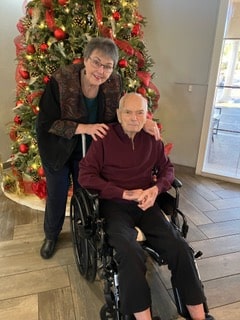
What New Cures Would Mean to Families
By Diane R., Nevada

In 2021, my husband, Larry and I found ourselves sitting at a medical center waiting for his test results. The doctor then came in and told us Larry was being diagnosed with Alzheimer’s disease. We were so scared. While this was a common dementia-related disease that impacts so many seniors, there wasn’t a catch-all treatment developed yet.
At first, Larry’s symptoms were slow to develop, and he could still manage his day-to-day activities on his own. Unfortunately, as we expected, his health took a sharp decline, and I made the decision to become his full-time caregiver.
Each day, I would make sure Larry had anything and everything he could possibly need. I would take him to doctors’ appointments, pick up his medications at the pharmacy and physically assist him around the house. There were some days that were manageable, but we had many tough and challenging moments, and my heart broke seeing him in this condition.
What many don’t realize is the impact being a full-time caregiver can have on the body and mind. For me, I developed chronic back pain from helping Larry up the stairs and lifting him in and out of bed. I struggled to keep up with household chores, and I even felt isolated from friends and family because I was always fearful to leave his side.
As Larry’s condition worsened, I reached a point where I could no longer physically care for him on my own. I looked into options like home health aides, but after various conversations with my family, we decided that Larry would be best served in a full-time memory care unit. It was a heartbreaking choice, but ultimately, I knew this would be the best plan for him.
While there were no treatments available at the time of Larry’s diagnosis to help slow the onset of his Alzheimer’s symptoms, I am grateful there now is an FDA-approved treatment for the early stages of this disease for patients and there are more medicines in development by biopharmaceutical researchers.
We are fortunate to live during a time where science has never been more promising. I hope our nation’s elected leaders don’t forget patients like my husband who are counting on U.S. biopharmaceutical leadership to support advances in medicine.
I hope for my husband and future patients, new treatment options become available soon, so nobody ever has to succumb to this horrible disease again.
Ready to Get Involved?
Make your voice heard to protect innovation.